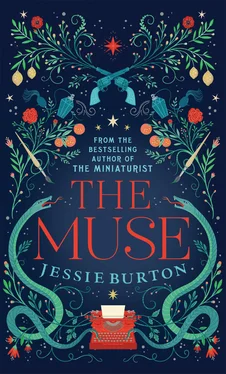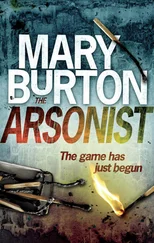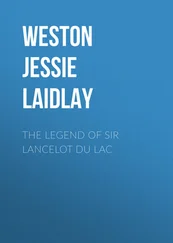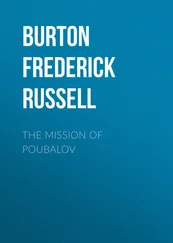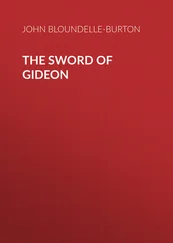As if he knew he’d trod on tender ground, Lawrie changed the subject. ‘It looks like there’s a couple of people interested in buying Rufina ,’ he said.
‘That’s good.’ I saw his rueful grin. ‘Isn’t it?’
‘Grass greener for Rufina. Told you I was a poet. Thing is, now there’s a chance I’m not going to have it any more, I’m rather reluctant.’
‘Well, it’s not any old painting.’
Lawrie looked across the gallery, where the colours of Rufina and the Lion glowed, the people crossing back and forth, intermittently obscuring our view. ‘It certainly isn’t. But what am I going to do with it, Dell? I don’t have any money and it isn’t going to feed me.’
As we looked at the painting, vanishing and reappearing again and again behind people’s heads, I knew that Lawrie and I were looking at different things. In its uniqueness, I read multiple stories. Through its technical brushstrokes, I experienced metaphysical sensations. It was a one-off I should do my utmost to protect and keep in public view. I could guess at the impulses behind the artist’s decisions, I could meditate on how the painting made me feel, but I understood that I would never know its truth.
But Lawrie saw something else. The new frame Reede had commissioned was a window, and the painting within was a curtain he was pushing aside. He claimed he was reluctant to sell it, but he hadn’t seen the cheque yet. He didn’t really want to keep hold of Rufina — although it was his mother’s, he seemed unbound by the memories it clearly had evoked for her. And why else had he come to the Skelton in the first place? He said it was to find me, but maybe I was a bonus. For him, the painting was a thing for sale, a transitional object that would take him places. He saw in it opportunity, a chance to start again.
Reede tapped his wine glass and began to address the crowd. He stood in front of Rufina and the Lion , starting by taking us through the skeleton story of Isaac Robles; his importance in the early journey of art in the twentieth century, his gift cut short. He thanked the Guggenheim foundation in Venice, and built on the particular mystery of the discovery, pointing out Lawrie in the crowd, who blushed and raised his glass to appreciative applause at his good fortune for having such a painting concealed in his house, and his generosity in deciding to show it.
When Reede spoke of how Robles’ work was a meditation on adversity, the people in the Skelton gallery probably thought he was talking about war and dictatorship, and the struggles many of them were old enough to have lived through and remember on a visceral level. But I just thought what Quick had said about it: It’s the subject that overwhelms. As if there’s an extra layer to the painting we’re not privy to, that you just can’t get at .
Rufina and the Lion moved me that night in a transcendental way; it was the conduit through which I channelled my sense of loss, of accepting I might never know the truth, but that that was the secret of art. And perhaps I wasn’t alone. Because after Reede had finished speaking, I noticed how people — even the old buffers in club blazers — began to look at Rufina with a little more respect.
*
The reviews for the opening night of ‘The Swallowed Century’ were mixed. Some were veritably lukewarm. ‘ The painting is a tableau that summons death, and it is wrong to ignore it ,’ was as praising as the journalist in the Telegraph went the next morning, before going on to speculate how much money it might fetch — ‘ Edmund Reede confirmed at the end of the night that Rufina and the Lion was going to auction .’ In The Times , there was an article on the star-studded event, with very little information on the artist himself. I smiled; Quick would have seen the irony in that. And when the journalist referred to the ‘ express symbolism ’ in the paintings, I disagreed. He was dismissing the painting as obvious, but I think there was another language in those paintings, and the only person who knew how to speak it was gone.
The Daily Mail asked whether the whole thing was an elaborate practical joke, that Isaac Robles should have been left where he was found, and that if this was the state of modern art, what fresh hells would we be forced to look at in the 1970s. The Observer , however, went in the opposite direction, congratulating Reede on refusing to rest on his laurels when it came to ‘ art history revisionism, forgotten painters and colour .’ It made me laugh, to think all these men had been looking at the same painting.
I felt Quick’s absence through the corridors, knowing that never again would the lunch summons come, never again would the restaurant next door send up a cold bottle of their best Sancerre. Reede was not in; I wondered if he’d seen the papers, and how we would deal with it. Pamela, who’d been informed about Quick, had been sniffling in the loos, and even the empty rooms felt as if they were in mourning. I wondered whether, had Quick been there, the reviews might have taken a more praising timbre; Quick cajoling the critics, forcing them to put their egos aside and see what was in front of their noses.
And yet, if anything, the Mail ’s diatribe helped us. There were queues forming to come in and see Rufina , to see if it was really a joke. But for me, it only made things worse. Why hadn’t Quick spoken up? Why was she so determined to keep her life a secret?
I began to meditate on what Lawrie had said about Quick doing me an enormous favour when she sent ‘The Toeless Woman’ to the London Review , and that I shouldn’t waste it. My green notebook had lain untouched for several weeks; but I just didn’t know what I wanted to write about. I don’t think Quick ever wanted me to feel in her debt; she had facilitated something, and was happy to do so. Nevertheless, I began to think about how I might thank her for what she’d done, in a way I hadn’t managed when she was alive. The funeral was scheduled for the following week, and I decided I would use the intervening time to write her eulogy. After all, Reede had left it to me and Pamela to organize, and no one else had volunteered.
The first post came late that day; Pamela was outside dragging dolefully on a cigarette and I was covering reception. It seemed strange to me to receive post at the Skelton, but there it was; an envelope with my name on it.
If the first letter Quick had sent me was a touchstone of transformation, then this was in another realm. Although I have received many extraordinary letters since that time, the one sent to me at the Skelton still beats them all.
A law firm called Parr & Co., whose offices were in Bread Lane in the City of London, were requesting my presence on Thursday — and would I please bring my passport and some proof of address? I recall how terrified I was. If you are made to feel, repeatedly, that you do not belong in a country, despite previous assurances to the contrary, then a letter telling you to bring your identity papers will freeze your blood.
I tried to imagine how Quick would deal with this. I felt lost without her assurance, the shelter of her steel wing. If I’d called Lawrie and told him, he wouldn’t understand, because he belonged. He was wrapped in a web of invisible yet unbreakable tissue, layer upon layer of it, that had begun to spin for him before he was even born, binding him in safety, giving him such a sense of security that no letter from a City lawyer would ever have scared him. His possible amusement at my nerves would only confirm my worry.
I decided to show it to Pamela instead. ‘What do you think it is?’ I said.
Читать дальше
